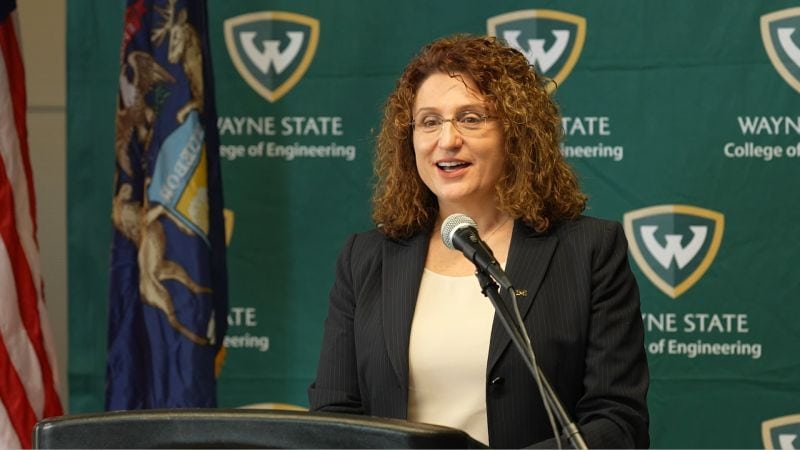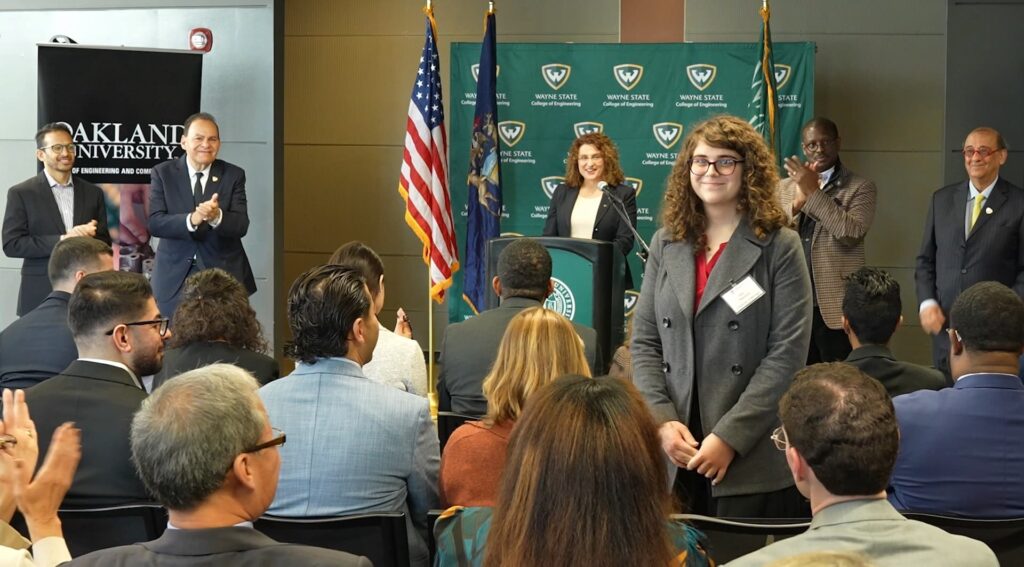
Michigan Engineering to launch semiconductor training program as part of statewide effort
The University of Michigan’s latest program to grow the microchip workforce aims to reach up to 600 participants a year.

The University of Michigan’s latest program to grow the microchip workforce aims to reach up to 600 participants a year.
As part of a $3.6 million initiative led by the Michigan Economic Development Corporation (MEDC) to expand semiconductor training opportunities in Metro Detroit, the University of Michigan will launch a series of hands-on, publicly available short courses in its advanced labs.
The initiative, announced recently at a press conference at Wayne State University, is the largest investment in state history to promote semiconductor learning and career opportunities. It includes 2023 MEDC grants as well as matching funds from Wayne State, Oakland University, U-M and Washtenaw Community College.
The U-M short courses will be aimed at high school and community college students and working technicians from semiconductor-related fields. The only background required will be high-school-level knowledge of math, chemistry, and physics. The goal is to broaden understanding and interest in semiconductor technology among the current and future workforce. Program developers expect to reach 600 participants a year.
“We’re thrilled at this opportunity to leverage U-M’s world-class facilities to give the students from our state unparalleled training. They’ll have access to the same tools and techniques used in modern semiconductor prototyping and manufacturing,” said Valeria Bertacco, the Mary Lou Dorf Collegiate Professor of Computer Science and Engineering at U-M and leader of the Michigan Advanced Vision for Education and Research in Integrated Circuits, or MAVERIC, collaborative. Bertacco spoke at the press conference announcing the MEDC-supported programs in the region.
U-M offerings will initially consist of three 1.5-day courses:
The courses will utilize U-M’s nationally renowned Lurie Nanofabrication Facility (LNF), its highly specialized Michigan Center for Materials Characterization (MC)2, and programmable hardware platforms supported by the Embedded Systems Lab.
“Semiconductor devices form the backbone of today’s society,” Bertacco said. “We envision these courses igniting curiosity and opening doors for Southeast Michigan young people and mid-career workers alike.”
The program plans to offer sessions twice a month to 25 students each. Participants will be recruited from high schools and community colleges in the region, including Washtenaw Community College, Wayne County Community College District, Macomb Community College, Henry Ford College, Schoolcraft College and more.
Bertacco recognized Ivris Raymond, a computer engineering doctoral student in her lab. Raymond is a first-generation college grad and Pell-grant recipient who recently received one of the most prestigious fellowships that the National Science Foundation gives to early-career researchers.

“In many ways, she epitomizes my hopes for the future of our field, our state and our society,” Bertacco said. “She is driven to find ways to continue advancing computing systems as we move past the limits of Moore’s law and to apply those technologies to create a more equitable society.
“Ivris came to U-M from the University of Arkansas to study, and Michigan is where she plans to begin her semiconductor career.”
This series of short courses represents just the latest development at U-M in support of revitalizing the domestic semiconductor sector. U-M co-founded the Michigan Semiconductor Talent and Automotive Research (MSTAR) center, a public-private partnership led by KLA and technology innovation hub imec that is focused on advancing semiconductors for the auto industry. The university is a founding member of two Department of Defense Microelectronics Commons regional innovation hubs. Researchers lead multiple NSF Future of Semiconductors projects and are partnering on additional regional semiconductor workforce development efforts. U-M’s LNF hosts students from across the country in the Michigan Semiconductor Hands-On Research Experience.
U-M is among the largest US institutions educating students in microelectronics and computing. Today more than 5,800 students are enrolled in its microelectronics-related undergraduate, master’s and Ph.D. programs. More than 40 influential microelectronics startups have spun out of the university in recent decades, advancing areas such as automated semiconductor manufacturing, ultra-low power Internet of Things devices and next-generation memory that offers unprecedented density and power improvements. In addition, over 95 local companies have utilized the LNF to develop their own products over the past five years.
Nicole Casal Moore
Communications & Public Engagement Director